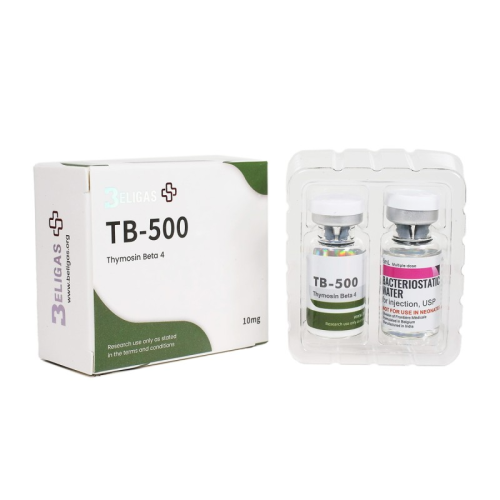Thymosin Beta 4 (TB-500) 10mg
- Brand: Beligas
- Product Code: Thymosin Beta 4 (TB-500) 10mg
- Availability: In Stock
-
$57.00
CLASSIFICATION
Multifaceted Peptide
ACNE
No
WATER RETENTION
No
HBR
No
HEPATOTOXICITY
No
AROMATIZATION
No
MANUFACTURER
Beligas
WAREHOUSE
International Warehouse 3
SUBSTANCE
Thymosin Beta-4
,
TB-500 is a synthetic version of Thymosin Beta 4 (TB4), a naturally occurring protein that aids healing and is found in nearly all human and mammalian cells. Research indicates that TB-500 has positive effects on wound recovery, flexibility, injury healing, and inflammation. These benefits arise from TB-500's role in blood cell and vessel formation, cellular differentiation, and cell movement. A significant aspect of its healing properties is attributed to its regulation of actin, a protein crucial for tissue repair.
TB-500 DosageTB-500 is available as a freeze-dried powder. Studies suggest that the most effective results are obtained by reconstituting thymosin peptides with 0.9% bacteriostatic sodium chloride. Dosage for TB-500 can vary between 5 mg and 20 mg per week, typically administered in 2-3 injections throughout the week. After the peptide has accumulated in the body, the weekly dosage is often reduced to a maintenance level of about half of the initial dose, which can be taken once a week.
TB-500 is generally injected under the skin, but it can also be administered intramuscularly if preferred.
Storage Instructions for TB-500Store the product at room temperature in a dry area away from light. An opened vial can be refrigerated for up to 8 days.
Overview of TB-500Research on TB-500 has highlighted several properties that have led to a global series of clinical trials evaluating its potential in promoting wound healing in the skin, cornea, and heart. Thymosin beta-4, which is produced in the thymus gland, is found in high concentrations in wound fluids, demonstrating its role in promoting tissue healing.
TB-500 is a synthetic peptide with high concentrations found in blood platelets, wound fluids, and other tissues. Unlike growth factors, the TB-500 peptides for research primarily serve as actin-regulating proteins. They are significant in protecting, regenerating, and remodeling damaged tissues. The gene for Thymosin Beta-4 is one of the first to be activated after an injury.
Being found in nearly all human and animal cells, Thymosin Beta-4 is a natural peptide that promotes wound healing. TB-500 helps in recovery by aiding the development of new blood vessels, muscle fibers, and blood cells, as well as enhancing cell movement. For individuals dealing with stress or injuries, TB-500 presents appealing healing effects.
Mechanism of Action for TB-500TB-500 aids recovery by influencing actin, enhancing this cellular protein's positive effects, which include promoting cell migration and proliferation. Consequently, new blood vessels are formed, and inflammation is regulated, optimizing healing processes. Additionally, TB-500’s unique molecular structure allows it to travel throughout the body, reaching areas in need of assistance. Users have reported benefits such as reduced inflammation and improved flexibility, with some even observing hair regrowth and darkening.
Potential Side Effects of TB-500TB-500 use is associated with various positive outcomes, including faster recovery, reduced inflammation, and improved flexibility. It is particularly effective for healing slow-healing injuries in connective tissues like tendons and ligaments, as well as muscle and skin injuries. Reports from users and researchers suggest that TB-500 typically has very few, if any, significant negative side effects.
Most peptides can cause mild lightheadedness or nausea during injection, and flu-like symptoms are common with many peptides. However, the occurrence of these side effects with TB-500 is reported to be minimal. Overall, TB-500 appears to be well-tolerated among its users.
The information contained on this website is not meant to replace professional medical advice and is not intended to diagnose, treat, cure, or prevent any disease.

